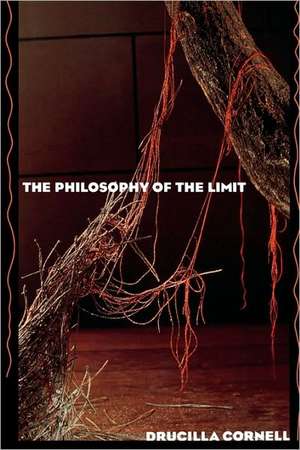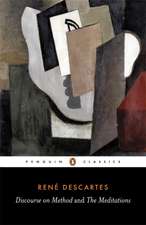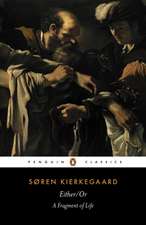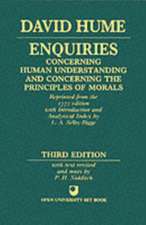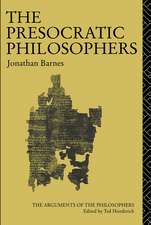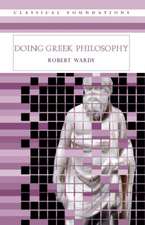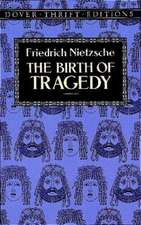The Philosophy of the Limit
Autor Drucilla Cornellen Limba Engleză Paperback – 10 apr 1992
Preț: 357.33 lei
Nou
Puncte Express: 536
Preț estimativ în valută:
68.37€ • 71.25$ • 56.61£
68.37€ • 71.25$ • 56.61£
Carte tipărită la comandă
Livrare economică 03-17 aprilie
Preluare comenzi: 021 569.72.76
Specificații
ISBN-13: 9780415902397
ISBN-10: 0415902398
Pagini: 230
Dimensiuni: 152 x 229 x 13 mm
Greutate: 0.48 kg
Ediția:New.
Editura: Taylor & Francis
Colecția Routledge
Locul publicării:Oxford, United Kingdom
ISBN-10: 0415902398
Pagini: 230
Dimensiuni: 152 x 229 x 13 mm
Greutate: 0.48 kg
Ediția:New.
Editura: Taylor & Francis
Colecția Routledge
Locul publicării:Oxford, United Kingdom
Recenzii
"This book is a major intellectual event. Nothing is more necessary and timely today than thinking through the possibility of a nonviolent relationship to the Other. The Philosophy of the Limit does just that. Learned, eloquent, passionate, rigorous, this book is not just a brilliantly original appropriation of Levinas, Lacan, and Derrida for legal studies, feminism, and frontier work in ethics. It also turns back from the perspective of legal theory to make a signal intervention in the domains of philosophy, literary theory, and cultural studies." -- J. Hillis Miller, University of California, Irvine
"The book constitutes an important intervention in contemporary intellectual debates by showing the ethical and juridical relevance of trends which are often dismissed as amoral or destructive. By rephrasing Derridian deconstruction as "philosophy of the limit," Cornell draws attention to what eludes our grasp: to alterity and the "Other" who is not at our disposal but demands our recognition and respect. Forging an innovative vista, Cornell integrates insights of Derrida, Adorno, Lacan, and Levinas (as well as recent jurisprudence), underscoring their significance for a transformative moral and legal practice. Splendidly argued and lucidly written, the book helps to refocus and reorient ongoing discussions about modernity and postmodernity." -- Fred Dallmayr, University of Notre Dame
"The Philosophy of the Limit is a brilliant exercise in thinking through major themes of deconstruction. In her encounter with the representative critical thinkers of today, Drucilla Cornell challenges us to follow her complex arguments and powerful rhetoric up to the limits of thinking finitude." -- Agnes Heller, Hannah Arendt Professor of Philosophy, New School for Social Research
"The book constitutes an important intervention in contemporary intellectual debates by showing the ethical and juridical relevance of trends which are often dismissed as amoral or destructive. By rephrasing Derridian deconstruction as "philosophy of the limit," Cornell draws attention to what eludes our grasp: to alterity and the "Other" who is not at our disposal but demands our recognition and respect. Forging an innovative vista, Cornell integrates insights of Derrida, Adorno, Lacan, and Levinas (as well as recent jurisprudence), underscoring their significance for a transformative moral and legal practice. Splendidly argued and lucidly written, the book helps to refocus and reorient ongoing discussions about modernity and postmodernity." -- Fred Dallmayr, University of Notre Dame
"The Philosophy of the Limit is a brilliant exercise in thinking through major themes of deconstruction. In her encounter with the representative critical thinkers of today, Drucilla Cornell challenges us to follow her complex arguments and powerful rhetoric up to the limits of thinking finitude." -- Agnes Heller, Hannah Arendt Professor of Philosophy, New School for Social Research
Cuprins
Introduction: What Is Postmodernity Anyway?; Chapter 1 The Ethical Message of Negative Dialectics; Chapter 2 The “Postmodern” Challenge to the Ideal of Community; Chapter 3 The Ethical Significance of the Chiffonnier; Chapter 4 The Good, the Right and the Possibility of Legal Interpretation; Chapter 5 The Relevance of Time to the Relationship between the Philosophy of the Limit and Systems Theory: The Call to Judicial Responsibility; Chapter 6 The Violence of the Masquerade: Law Dressed Up as Justice; Conclusion: “The Ethical, Political, Juridical Significance of the End of Man”;
